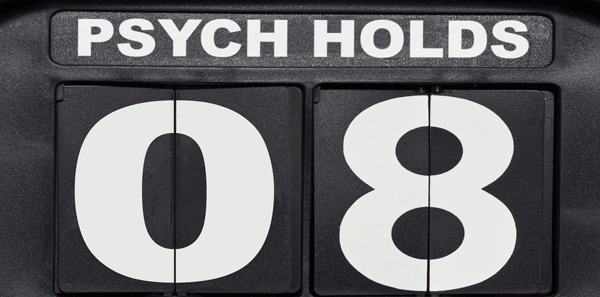
One in eight visits to the emergency department is related to a mental health or substance abuse issue. That number has grown each year over the past decade.1 An informal poll of ACEP members showed that 100 percent of those asked had at least one behavioral health patient remaining in their emergency department for a multiple day stay in the past week.
Appropriate treatment for this vulnerable population is a high priority. An often loud and hectic ED setting is arguably one of the worst environments for a patient under mental stress. ACEP has long advocated for better access to facilities designed to care for behavioral health patients. The Improving Mental Health Access from the Emergency Department Act (H.R. 2519) was pushed forward by ACEP earlier this summer. This ACEP-drafted legislation would provide additional resources for patients with acute mental health needs who seek care in the ED due to a critical shortage of inpatient and outpatient resources. Working in parallel, the ACEP Coding and Reimbursement teams have been hard at work fighting for funds to care for these patients during their prolonged ED stays.
We all know that resources follow revenue. Historically, there was no approved way to capture the subsequent days of care provided after the initial ED visit, which was typically reported using the appropriate ED evaluation and management (E/M) code (99281–99285). As a result, long, multi-day mental health stays created both uncompensated care issues and further strained the safety net provided by our nation’s emergency departments.
Emergency providers faithfully support the safety net for our most vulnerable patients. We now have a mechanism and clear guidance to bill for multiday mental health stays.—Michael Granovsky, MD, FACEP
Due to the escalating mental health crisis, ACEP’s current procedural terminology (CPT) team has worked through the American Medical Association (AMA) CPT Editorial Panel and CPT Assistant, the monthly AMA publication that offers guidance related to correct use of the CPT code set, to seek a solution for this problem.
ACEP submitted a typical behavioral health vignette to CPT staff illustrating a patient who had presented with a behavioral health crisis who also required medical care while waiting to find an available inpatient psychiatric bed. The patient described presents with agitation, is severely decompensated, and has auditory hallucinations. The documented medical history reveals he has been off his medication for two weeks and has a prior suicide attempt. He has a history of diabetes and his glucose level is elevated. The plan is for a psychiatric admission, but no psychiatric beds are available at this hospital, and the patient remains in the emergency department for three days until he can be transferred. The patient remains under the care of the ED group for daily rounds, medication adjustments, and the management of any threats to the patient or hospital staff. On the third day, available space is found, and the patient is transferred to the psychiatric facility. Traditionally, coding guidance had been that “psych holding patients” did not meet the requirements to report observation services.
Pages: 1 2 3 | Single Page





No Responses to “Extended ED Mental Health Care Now Reportable as Observation”